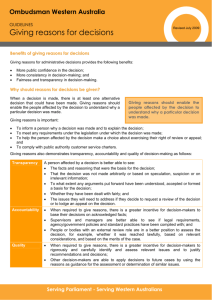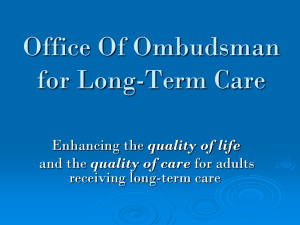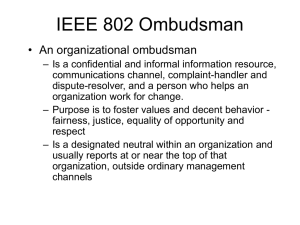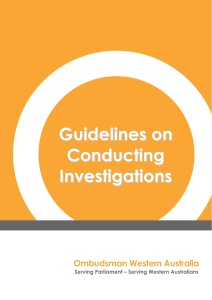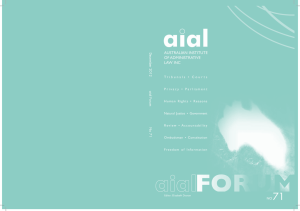Good record keeping
advertisement
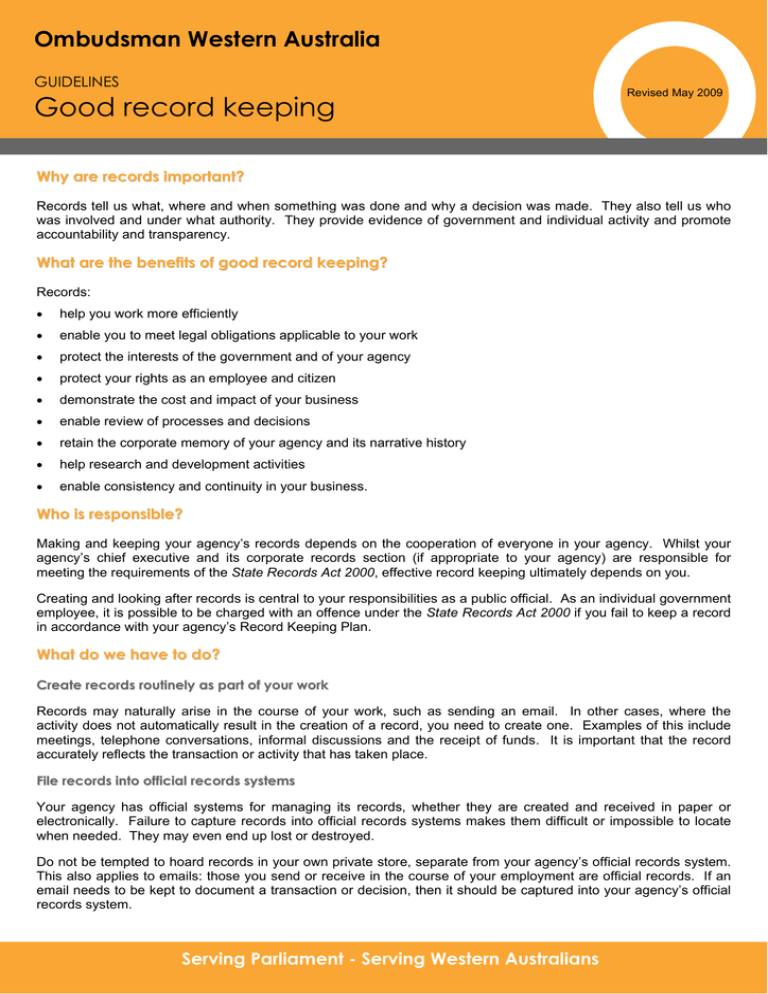
Ombudsman Western Australia GUIDELINES Good record keeping Revised May 2009 Why are records important? Records tell us what, where and when something was done and why a decision was made. They also tell us who was involved and under what authority. They provide evidence of government and individual activity and promote accountability and transparency. What are the benefits of good record keeping? Records: help you work more efficiently enable you to meet legal obligations applicable to your work protect the interests of the government and of your agency protect your rights as an employee and citizen demonstrate the cost and impact of your business enable review of processes and decisions retain the corporate memory of your agency and its narrative history help research and development activities enable consistency and continuity in your business. Who is responsible? Making and keeping your agency’s records depends on the cooperation of everyone in your agency. Whilst your agency’s chief executive and its corporate records section (if appropriate to your agency) are responsible for meeting the requirements of the State Records Act 2000, effective record keeping ultimately depends on you. Creating and looking after records is central to your responsibilities as a public official. As an individual government employee, it is possible to be charged with an offence under the State Records Act 2000 if you fail to keep a record in accordance with your agency’s Record Keeping Plan. What do we have to do? Create records routinely as part of your work Records may naturally arise in the course of your work, such as sending an email. In other cases, where the activity does not automatically result in the creation of a record, you need to create one. Examples of this include meetings, telephone conversations, informal discussions and the receipt of funds. It is important that the record accurately reflects the transaction or activity that has taken place. File records into official records systems Your agency has official systems for managing its records, whether they are created and received in paper or electronically. Failure to capture records into official records systems makes them difficult or impossible to locate when needed. They may even end up lost or destroyed. Do not be tempted to hoard records in your own private store, separate from your agency’s official records system. This also applies to emails: those you send or receive in the course of your employment are official records. If an email needs to be kept to document a transaction or decision, then it should be captured into your agency’s official records system. Serving Parliament - Serving Western Australians Good record keeping Revised May 2009 Handle records with care For paper records to survive and be available for as long as they are needed, they must be properly cared for. Avoid storing records near known hazards and try not to damage them. Records are a corporate asset of your agency and do not belong to you. Do not remove them from official records systems for extended periods of time or take them out of your agency. It is important they remain available to other staff. Do not destroy records without authority Your agency’s records, whether paper or electronic, generally cannot be destroyed without proper authority from your agency’s records staff. Some kinds of records have only temporary value and can be destroyed when no longer needed. Make sure you know which records are required long term and which are not. This information is part of your agency’s Retention and Disposal Schedule, and records staff can provide information about this. Failing to maintain records for the length of time they are needed puts you and your agency at risk of being unable to account for what has happened or been decided. This can result in problems for your agency’s clients, monetary losses from penalties or litigation, embarrassment for your agency or the Government, or, in extreme cases, disciplinary action for you or your colleagues. Protect sensitive records from unauthorised access Records can contain personal and confidential information which must not be disclosed to unauthorised persons. Ensure that records storage areas are secure, protect passwords and do not leave sensitive records lying around. Know your agency’s policies and procedures for managing records Every WA public sector body is required to establish policies and procedures for the management of their records in all forms. It is every public official’s responsibility to create and keep records according to their agency’s Record Keeping Plan. You can help support good record keeping in your agency by being familiar with these policies and procedures and applying them so you can better create and manage records in your daily work. What happens to records once the business need ceases? Most of your agency’s records, whether paper or electronic, can be destroyed with proper authority from your records staff. However, some records have permanent value to the State and to the people of Western Australia as evidence of your agency’s activities and the role of government in our society. These records will become State archives to be retained permanently and transferred to the State Records Office once they are 25 years old. Subject to certain restrictions, they will be made available to the public on request and to future generations of researchers who might use these records many years from now. Make sure you know which records you deal with have continuing value. Good record keeping includes taking proper care of records which have archival value and will be retained permanently. Record keeping tips Meetings Delegate someone to make a record of the meeting, either minutes or a simple summary of decisions. Ensure decisions and dissent are clearly recorded. Circulate the minutes of the meeting to other participants and sign or confirm the accuracy of the record. Conversations Make a record of significant business you conduct via the telephone or face-to-face, such as: providing advice, instructions or recommendations giving permissions and consent making decisions, commitments or agreements. Ombudsman Western Australia Good record keeping Revised May 2009 Transcribe voicemail messages or capture the message directly into your agency’s official records system. Decisions and recommendations Document reasons for decisions or recommendations that you make. Correspondence File or attach emails, letters, faxes and internal memos (sent or received) that relate to your work onto files within your agency’s official records system. Further information Australian Standard AS15489 Records Management State Records Act 2000 State Records Commission Principles and Standards 2002 State Records Office of Western Australia Record Keeping in Western Australia: Who is Responsible Your agency’s Record Keeping Plan and Retention and Disposal Schedule Acknowledgements We acknowledge material from the NSW State Records Office and NSW Ombudsman, and advice from the State Records Office of WA. Ombudsman Western Australia Level 2, Albert Facey House, 469 Wellington Street Perth WA 6000 • PO Box Z5386 St Georges Terrace Perth WA 6831 Tel 08 9220 7555 • Freecall (outside metropolitan area) 1800 117 000 • Fax 08 9220 7500 Email mail@ombudsman.wa.gov.au • Website www.ombudsman.wa.gov.au
